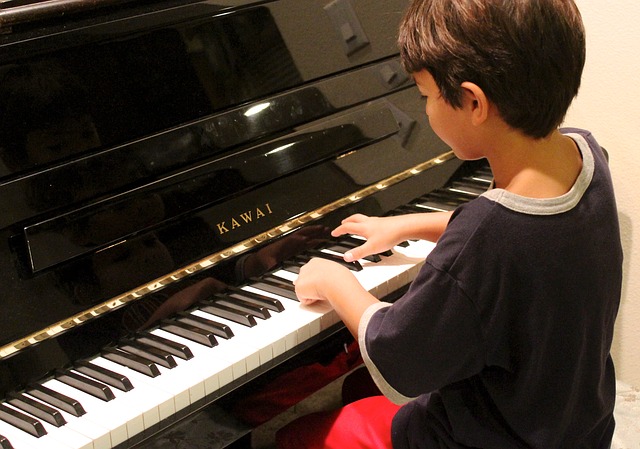Scientific studies have shown that children who start taking piano lessons from a very young age (usually 5-8 years), register a better development of their mental skills and are also quicker to learn fine motor skills, as compared to other kids of their age group. Getting accustomed to piano playing from an early age also instils in a child better sense of discipline, an excellent hand-eye coordination, an impeccable taste in good music and if he/she grows up to become an accomplished piano player, it can serve as a valuable skill on his/her CV!
So, does that mean you should make your toddler sit on the computer and watch piano lessons on YouTube or engage a professional piano tutor for your 5 year old immediately? No. You, as a parent need to find out if your kid has or developed the ability/interest to play a piano and for that you cannot just depend on your intuition or parental logic. You need to look for some pointers and signs that will help you understand if your child is ready for a piano lesson to commence.
What Age to Start Piano Lessons?

There is no predefined fixed age at which your child is bound to become ready for a piano lesson. A child may be 8 years old but he might not show the same learning capability or level of interest in pianos as say, a 5 year old! However, it is usually agreed upon that 5-8 years is the ideal age group for kids to start learning piano. At the same time, it is important to assert the fact that it is never too late to start learning a piano (or anything in life for that matter)! Yes, it becomes a bit more difficult for an older child or person as they have to deal with more pronounced finger stiffness and awkwardness but practice and desire can help them overcome this difficulty. Also, grown ups or kids who are already at an advanced stage of schooling will have that much less time to practice piano as say a 5 or 6 years old child, hence making it harder to accommodate piano lessons in their already busy life.
– Look for certain pointers – Are their hands big enough to place five fingers on five adjacent white keys? Are they able to read (not read music, but in general) well enough? Is there a genuine interest shown by the child in learning piano specifically?
So, now that you know how to find out if your child is ready for his/her piano lessons, what should be your next step? Take him/her to a piano teacher, of course! But is that all that YOU as a parent have to do? No. There are a number of things which you need to accomplish as a parent/guardian as well!
1. Buy a Piano/Keyboard for your child
You can opt to purchase a piano right at the start of your kid’s piano lessons or wait for about a year or so, to see if your kid really deserves his/her own piano. While purchasing a piano at the very start can prove to be a costly investment (in case your kid loses interest in piano in a few months), it always helps to have a piano at home on which your kid can practice any time he/she wants. You do not have to buy one of those expensive acoustic pianos, instead your child can learn as efficiently on the much less expensive digital pianos (see our reviews here), which are a replica of the acoustic pianos with matching sound quality and key action. You can also, buy a second hand acoustic piano to ward off unnecessary investment risks.
2. Make sure that your child practices enough
Practice is the key for anyone learning to play the piano. You, as a parent need to ensure that your child practices enough on his/her own after his formal lessons. Make sure that he gets his own space and time at home to practice piano in quiet and without any interference/disturbance. Just like his/her study chart, it is advisable that parents make a separate chart or incorporate in the already existing chart of academics and games, a fixed time for practising piano. This helps in developing piano playing as a habit in children.
3. Ensure your child’s interest levels stay high
Your role as a parent here entails showing an equal (if not greater) level of interest in playing a piano as your child. This will motivate him/her to put extra effort in learning the skill and help to achieve that extra bit of perfection. Kids may feel that they are wasting their time learning a piano, if as a parent you do not acknowledge his progress. Also, they tend to get ‘bored’ easily if kids are doing something alone, without anyone to notice or encourage them.
4. Teach basic reading skills
Before you decide to take your kid for piano lessons at a very young age, you must ensure that he has developed at least the basic reading skills. This helps while learning to read the musical notes, which involves reading alphabets (from A to G) left to right as well as backwards.
5. Explain left and right
Make sure that your kid recognizes his left from right, and is able to determine which is his more dominant side himself. Ambidexterity is an essential requirement in piano playing and so, while learning it is important that your kid plays with both hands and not just the one which is his natural side. Playing with both hands is required to gain more control over the piano keys and play them out perfectly. You as a parent need to ensure that your kid practices with his weaker side more, in order to gain an equal level of control in both the hands. A useful way to accomplish this is by making them do their daily tasks (such as brushing teeth) with the weaker hand.
6. Recognize concentration levels of your kid
Concentration develops with age. It is much harder for a 4 year old to concentrate on something in particular than a more grown up kid of say 6-7 years old. You must ensure that your kid is able to concentrate on a particular topic for a duration of at least 30-40 minutes, before you start with his piano lessons.
7. Inculcate discipline
A piano lesson requires focus, determination, discipline and commitment of very high order. You must start inculcating discipline and high concentration levels in your kid from beginning, in every walk of life. While these qualities will help him/her master the piano, they will also help him/her become a better human being and achieve an all-round success in his life.
8. Be patient
Your kid may not turn out to be the prodigy you (and him/her) were hoping to be but that doesn’t mean he/she should give up on piano already. It takes a while for kids to master this art and you as a parent, are supposed to encourage them till they have become proficient enough. There is no prescribed time limit inside which they will finish learning piano, and so you will need to be supportive of them till they master the art. Never compare them with other kids and do no nag them about their weakness either.
9. Talent alone isn’t enough
As talented and inclined towards piano your kid might show to be, having a talent is never enough to master a art. He/she (and you) will need to nurture the talent and develop it as a skill. Your kid must understand that even if he/she is naturally talented at playing a piano, he/she will need to practice those long hours in solitude, in order to become perfect at it. Your duty as a parent will be to ensure that he/she practices enough, but also never try to force it upon him/her.
10. Control costs
Piano lessons don’t come cheap and paying for individual lessons are still costlier. Adding the transportation cost (if the piano school is a bit far) and the cost of purchasing a good piano, the whole process can prove to be a burden on your pocket. It is always advisable to calculate the approximate monthly/annual cost of piano lessons, before you get your kid enrolled in one. If you want to keep the cost down, look for students/college goers who can teach your kid -they will charge less and impart the same basic techniques. You can also arrange for a monthly/fortnightly payment term with the teacher/school for piano lessons. Also, a group session will always cost you much less than an individual course.

It’s good to know that you should notice their progress so they don’t get discouraged or bored. I’m wanting to enroll my son in piano lessons so he can appreciate music and be more well rounded. Looks like I should incentivize him so he doesn’t get bored while practicing his piano.
What great reminders to parents that they have a significant role in the success of their piano student. Thanks for sharing.
Thank you, I always do O exercises to exercise my fingers and strengthen the chords